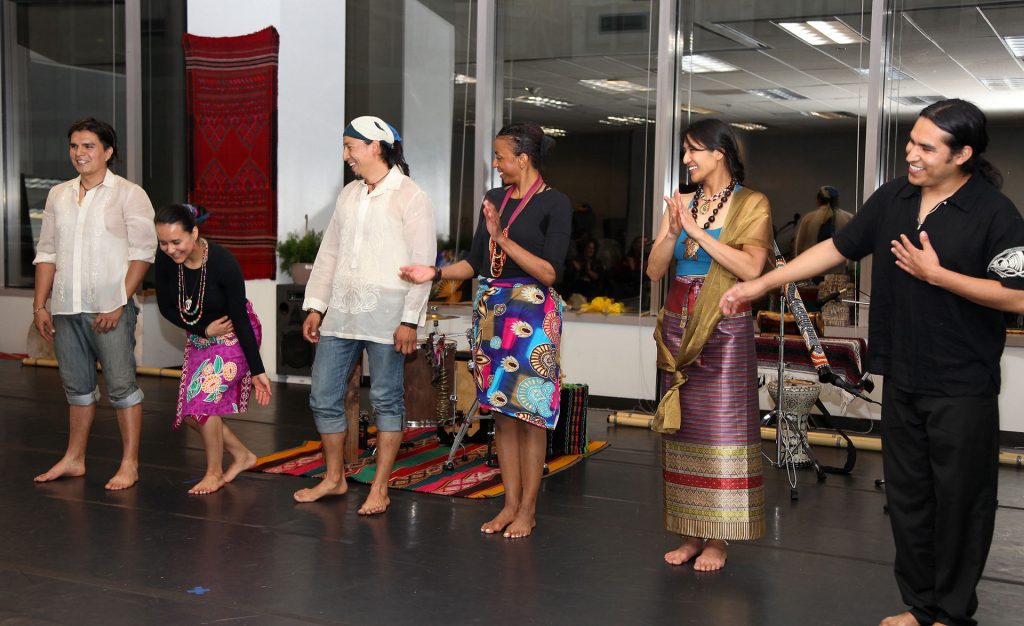CHARLOTTE STREET FOUNDATION STUDIO RESIDENCY PROGRAM
Charlotte Street Foundation identifies the needs and fuels the evolution of an ever-changing multidisciplinary arts ecosystem, acting as its primary provocateur. We cultivate the contemporary, the exceptional, and the unexpected in the practice of artists working in and engaging with the Kansas City Art Community
Narrative, Nostalgia, and New Perspectives: Karen Lisondra’s Take on Theater
By Autumn Sauer
Karen Lisondra is a storyteller. She doesn’t just tell her own stories though. She speaks about the experiences of many people, making sure every voice is heard. Karen isn’t always speaking either, sometimes that really doesn’t get the whole point across. Her practice as a performer encompasses a variety of methods: acting, dancing, singing, music making, and even puppetry, just to name a few. Karen’s multi-disciplinary approach shows how she lives out her art, involving communities, cultures, and numerous activities into her work.

Although Karen has been performing with Charlotte Street since her husband Amado Espinoza‘s residency began back in 2015, having her own residency has been a way for her to explore and expand her own personal projects. Karen’s imaginative and mellow personality, along with her perspective on theater, gives way to fresh ideas and authentic storytelling.
[Autumn]: When did you get involved with Charlotte Street?[Karen]: My husband was a resident a couple of years ago. He was a two-year resident from 2015 to 2017. We collaborate, so we did things together and co-directed a big play in 2016 at the Arts Asylum and that was a contemporary indigenous performance. So there was a Cherokee dancer, a contemporary dancer, and a traditional pre-Aztec Mexican dancer, with Andean and Filipino dances as well. It was like all of the elements: earth, wind, fire, and water. Over a year and a half, we taught each other, we went back to our homelands, we learned instruments, and made instruments. We made a lot of our costumes and there was another resident who made this beautiful poncho for us out of alpaca and natural, native grasses—so that was really cool. It was like a shared ritual and the audience didn’t have to know too much because it was very music and dance based with very little text. It created this atmosphere for the audience to feel brotherhood and think, “I’m in something special.” There was lots of incense and traditional songs. We were given permission by the Mapuche tribe for a protest song and a couple of costumes that were over 250 years old. They were given to us for special art purposes. That was a really special thing.
Beyond her work for the Charlotte Street Foundation, Karen has also worked with the University of Missouri-Kansas City’s graduate theater program.
“Last year, I did a project at UMKC with theater students in graduate school. It was a devised project, which means that we started with a theme and we wrote the script and we came up with all of the ideas… [picks up a mask] and this is one of the masks. I’ve translated it and we’re adapting it with fewer actors and we’re taking it down to Bolivia in August. So I’ve been doing a lot of the production side for that.”
The show, called “The Story Telling Project,” was greatly influenced by Karen’s time spent in South America.
“I lived in Bolivia for six and a half years doing theater. It was an amazing theater scene. South American theater is awesome. That’s one reason I’m taking my students down to Bolivia. Outside of the United States, theater is not as competitive. Everybody helps each other out. In order to survive as an artist, you have to give and take. My experience in South America, in both Argentina and Bolivia, was just so fascinating. You’re doing your own art. So many people are writing their own shows. It’s a lot of ensemble-based theater. The sense of community is so much stronger and it’s not as commercially based. There’s a very helpful and wise infrastructure, so there are lots of theater festivals in South America. So once you have enough quality to get on the circuit, then you’re good. You build the show and then take it around and with that money, you build the next show.”

When it comes to what’s next, Karen has a lot of things cooking.
“I have an idea in the works for a little bit of a larger project, but they’re always long-term. I don’t work in very traditional theater where it’s like boom, three weeks in and it’s done. At least for my own self, my projects take time to develop. Also, I’m learning cello for it, so it won’t be for quite a while. I’ve been playing for a few years, but we’ll see.”

“Oh, I almost forgot to mention grandma! I am also developing a small show. I don’t know if it’s going to be a library thing or larger, or just some kind of performance art installation. She is really recent. Our neighbor, who’s a retired Hallmark artist, he helped us out with all of these masks and has a lot of time on his hands. So he came to us and said, “Do you remember that puppet we were talking about two years ago?” because I had mentioned how I’d like to start doing Bunkaru puppetry—it’s so fascinating to me. We designed this old lady puppet [grandama] and so I’ve been working with it a little bit. We’ll see if it’s more of a documentary-type show. I don’t talk. I would like to include other people’s story about their relationship with their grandmother or it may be an adaption of Orpheus and Eurydice.”
Karen will be performing at this year’s Open Studios event, Saturday, April 20. Come and get a peek into the Andean Cosmovision. Let Karen captivate you with her performance and thrill you with her vivid storytelling. Grandma might even be around to say hello.



